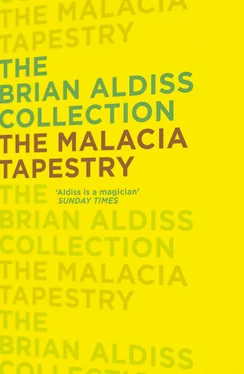‘Kemperer might give us a breakfast snack, even if there’s no work.’
‘That depends on his temper,’ de Lambant said. ‘And that depends on La Singla and how she has been behaving herself.’
To which I made no answer. There was some slight jealousy between us concerning Kemperer’s wife. Pozzi Kemperer was the great impresario, one of the best in Malacia. Both de Lambant and I had been in his company for the better part of two years; our present lack of employment was nothing new.
On the quayside, a swarm of men were in action, mostly working bare-chested and barefoot, heaving on ropes, tugging winches, hauling boxes. The trireme was being unloaded. Various onlookers were delighted to inform us that the vessel had come up the River Toi from Six Lagoons, trading from the West. The optimists thought it might carry statuary, the pessimists that it might bring plague.
As we arrived, customs officials in tricorne-hats were marching off the vessel. They would have been searching for forbidden goods, in particular any new thing which might upset the mellow flow of existence in Malacia; although I could only approve their mission, they were a poor, mothy collection, despite their hats and uniforms, one man limping, one half-blind, and a third, judging by appearances, lame, blind and drunk into the bargain.
Guy and I had watched such scenes since we were children. Boats arriving from the East were a better spectacle than those from the West, since they often carried exotic animals and black female slaves. As I was turning away, not unprompted by the rumbling of my stomach, I noted a strange old figure hopping up and down on the deck of the trireme.
His body was cut into pieces by the yards, but in a moment he turned and came down the gang-plank, carrying a box under one arm. He was stooped and white of hair, while something about his dress suggested to me that he was a foreigner – though he was not one of the mariners; indeed, I believed I had seen him about Malacia before. He wore a tattered fur jacket, despite the heat of the day. What took me was the mixture of delight and caution on his whiskery countenance; I tried setting my face in the same expression. He made off smartly into Stary Most and was lost to sight. The city brimmed with crazy characters.
Several carriages were drawn up along the Satsuma. As de Lambant and I made off we were hailed from one of them. The carriage door opened, and there was my sister Katarina, smiling a sweet smile of welcome.
We embraced each other warmly. Her carriage was one of the shabbiest there, the Mantegan arms peeling on the coachwork. She had married into a ruined family; yet she herself was as neat as ever, her long, dark hair pinned severely back, the contours of her face soft.
‘You’re both looking very idle,’ she said.
‘That’s part nature, part artifice,’ said de Lambant. ‘Our brains are quite active – or mine is. I can’t speak for your poor brother.’
‘My stomach’s active. What brings you here, Katarina?’
She smiled in a sad fashion and gazed down at the cobblestones.
‘Idleness also, you might say. I came to see the captain of the vessel to find out if there was word from Volpato, but he has no letters for me.’
Volpato was her husband – more often absent than present and, when present, generally withdrawn. Both de Lambant and I made consoling noises.
‘There will be another ship soon.’ I said.
‘My soothsayer misled me. So I’m going to the cathedral to pray. Will you join me?’
‘Our Maker this morning is Kemperer, sweet sister,’ I said. ‘And he will make us or break us. Go and act as our Minerva. I’ll come and visit you at the castle soon.’
I said it lightly meaning to reassure her.
She returned me a concerned look. ‘Don’t forget, then. I went to see Father last evening and played chess with him.’
‘I wonder he had time for chess, burrowing among his old tomes! A Disquisition on the Convergences – or is it Congruities or Divergencies? – for I never seem to remember – Between the High Religion and the Natural Religion and Mithraism and the Bishop’s Nostrils!’
‘Don’t make fun of your father, Perian,’ Katarina said gently, as she climbed back into her carriage, ‘His work is quite important.’
I spread my hands eloquently, tilting my head to one side to show pity and resignation.
‘I love the old boy, I know his work is important. I’m just tired of being lectured by him.’
As de Lambant and I walked along the quay in the direction of the Bucintoro, he said, ‘Your sister in her dove-grey dress – really quite fetching in a sober way … I must visit her in her lonely castle one of these fine evenings, though you are disinclined to do so. Her husband similarly, it appears.’
‘Keep your filthy thoughts off my sister.’ We talked instead about de Lambant’s sister Smarana, whose wedding day, determined by a useful conjunction of constellations, was little more than five weeks away. The thought of three days of family celebration cheered us, not least because the two families involved, the de Lambants and the Orinis, had engaged Kemperer’s company to play on the second day. We should have work then, at least.
‘We’ll perform such a comedy as all will remember ever after. I’m even prepared to fall down the stairs again for the sake of an extra laugh.’
He dug me in the ribs. ‘Pray that we eat before that date, or I can see us treading the boards in the Shadow World. Here’s the market – let’s run different ways!’
The fruit market stood at the end of the Stary Most district. At this time of morning it was crammed with customers and buzzing with argument, gossip, and wasps the size of thumbs. De Lambant and I slipped among the stalls at a trot, bouncing off customers, swerving round posts, to arrive together at the other end laughing, with a good muster of peaches and apricots between us.
‘A day’s work in itself,’ de Lambant said, as we munched. ‘Why bother to go to Kemperer’s? He has nothing for us. Let’s make for Truna’s and drink. Portinari will probably be there.’
‘Oh, let’s go and see the old boy anyway, show him we’re alive and thin for want of parts.’
He struck me in the chest. ‘I don’t want for parts. Speak for yourself.’
‘I certainly wouldn’t want to speak for what is doubtless unspeakable. How the women put up with those digusting parts of yours is beyond credit.’
At the corner of a certain scrivener’s stair stood an ancient magician called All-People. All-People stood at the scrivener’s stair whenever the omens were propitious, and had done so since the days when I was taken to market on piggy-back. His face was as caprine as that of the billy goat tethered to the post beside him, his eyes as yellow, his chin as hairy. On his iron altar a dried snake burned, the elements sprinkled on it giving off that typical whiff of the Natural Religion which my priest, Mandaro, referred to contemptuously as ‘the stench of Malacia’.
Standing in the shade of the scrivener’s porch consulting All-People was a stooped man in a fur jacket. Something in his stance, or the emphatic way he clutched a box under his arm, caught my attention. He looked as if he was about to make off faster than his legs could carry him. Always watching for gestures to copy, I recognised him immediately as the man who had come smartly off the trireme.
Several people stood about waiting to consult All-People. As we were passing them, the magician threw something into the hot ash of his altar, so that it momentarily burnt bright yellow. My attention caught by the flame, I was trapped also by All-People’s amber gaze. He raised an arm and beckoned me with a finger, red and twisted as an entrail.
Читать дальше












